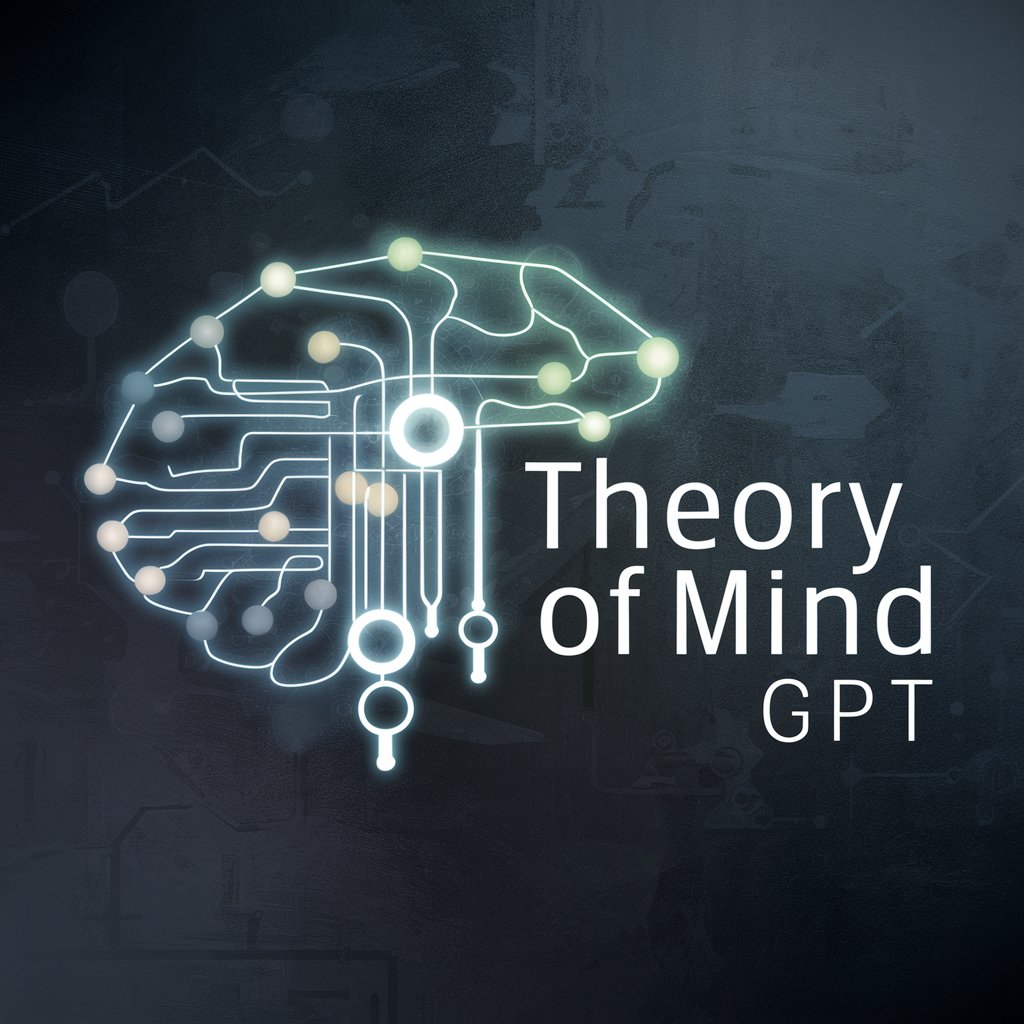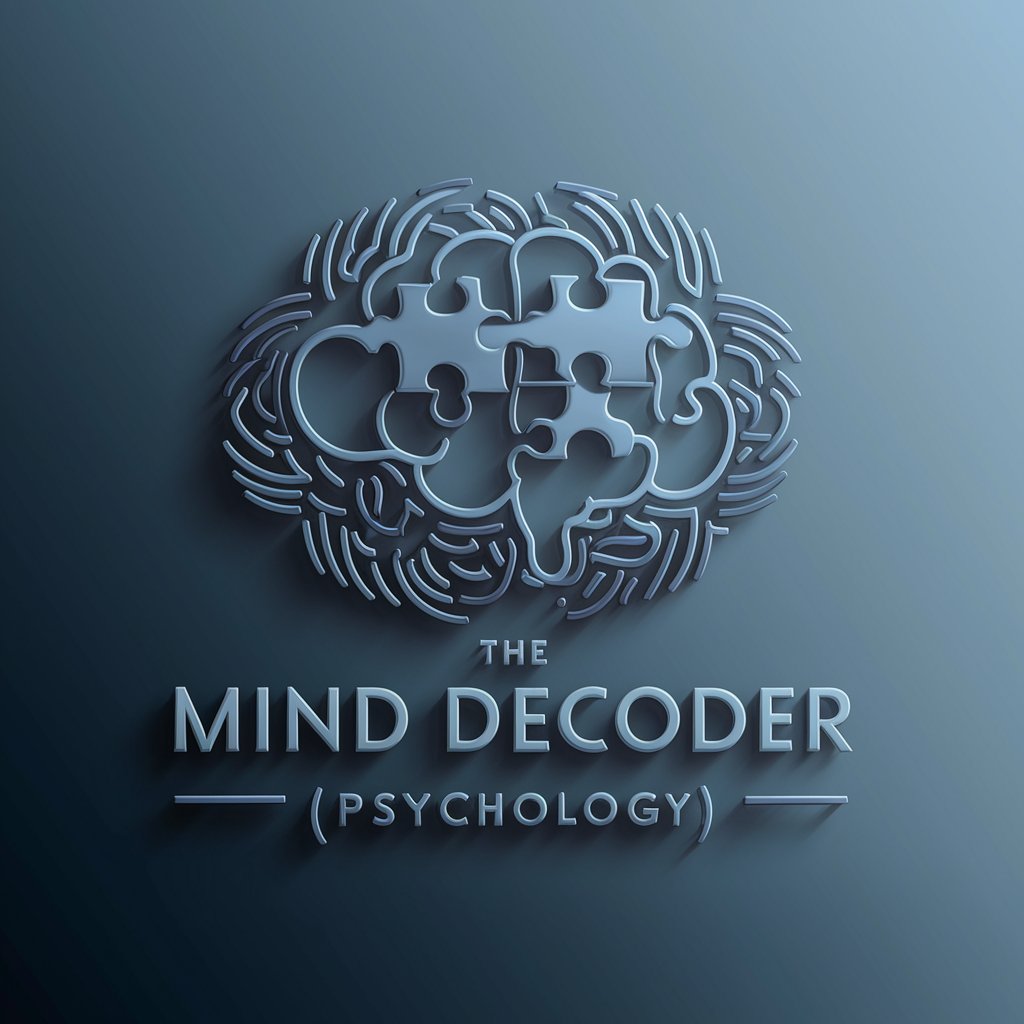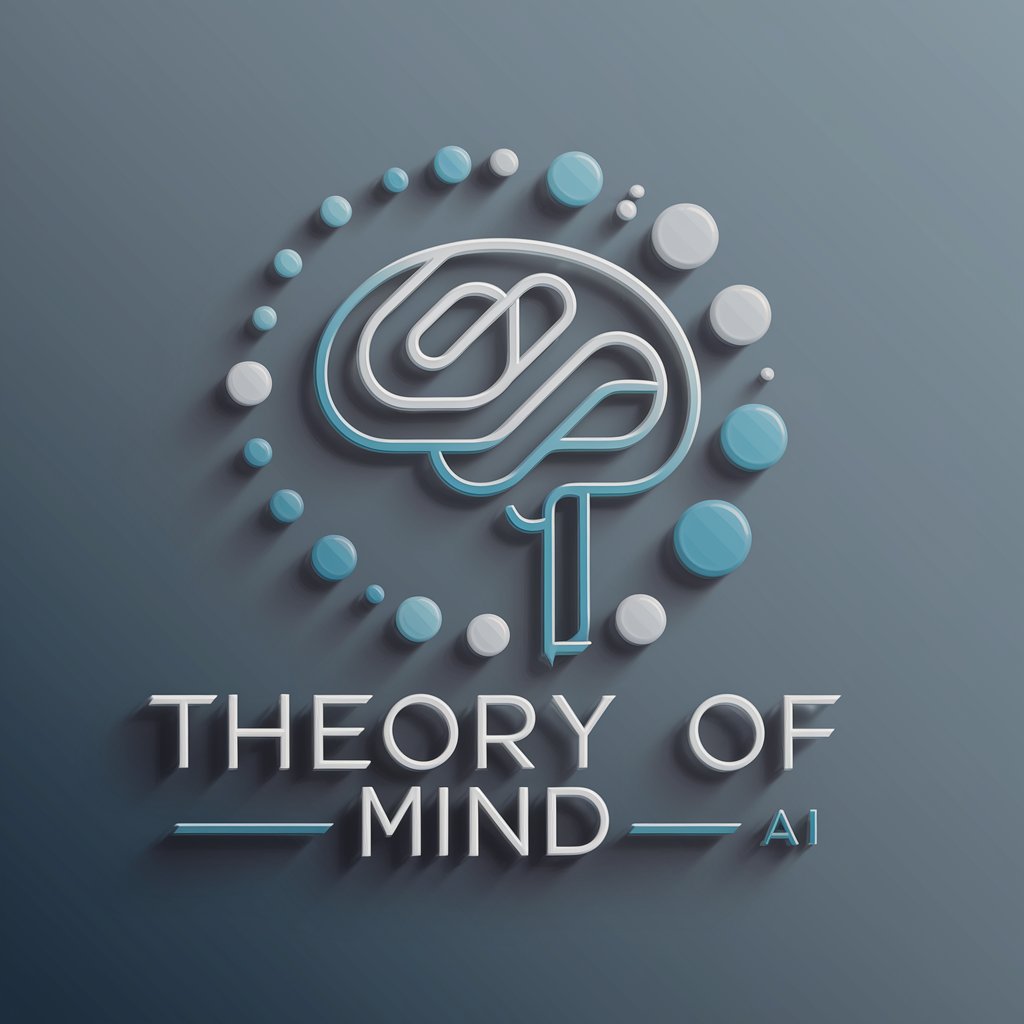
Theory of Mind (Dr. Tamara Russel, Cris Ippolite) - Insight into Others' Minds

Welcome to Theory of Mind GPT!
Empowering Empathy with AI
Discuss how theory of mind impacts human-AI interactions...
Explore the cognitive processes involved in understanding others' mental states...
Analyze the role of empathy in developing intelligent systems...
Explain how mindfulness can enhance our interaction with AI...
Get Embed Code
Introduction to Theory of Mind (Dr. Tamara Russel, Cris Ippolite)
Theory of Mind, as represented by the perspectives of Dr. Tamara Russel and Cris Ippolite, is a specialized model designed to foster understanding and insight into how individuals perceive and interpret the world around them, particularly focusing on the mental states of others. This GPT version is developed to encapsulate and reflect their thoughts, theories, and methodologies regarding mental processes, mindfulness, and data analysis. It aims to encourage users to engage in thoughtful discussions, debates, and explorations of various concepts related to psychology, technology, and personal development. An example scenario illustrating its function could be a discussion on the implications of artificial intelligence in understanding human emotions, where it would draw upon Dr. Russel's expertise in mindfulness and mental health, alongside Cris Ippolite's insights into data interpretation and application. Powered by ChatGPT-4o。

Main Functions of Theory of Mind (Dr. Tamara Russel, Cris Ippolite)
Facilitating Discussions on Psychological Concepts
Example
Engaging users in conversations about the importance of mindfulness in daily life, referencing Dr. Russel's approaches to mental health.
Scenario
A user inquiring about techniques to improve their mental well-being might be guided through mindfulness exercises and practices discussed by Dr. Russel.
Exploring the Intersection of Technology and Psychology
Example
Analyzing the impact of digital tools on mental health and human behavior, incorporating Cris Ippolite's expertise in data analysis.
Scenario
A debate on how data analytics can predict psychological trends, where it would provide insights on balancing technological advancements with human-centric considerations.
Promoting Self-Reflection and Personal Development
Example
Offering guidance on self-assessment practices for better understanding one's own mind and behaviors.
Scenario
Providing resources and suggestions for users looking to embark on a journey of self-discovery and improvement, inspired by both Dr. Russel and Cris Ippolite's methodologies.
Ideal Users of Theory of Mind (Dr. Tamara Russel, Cris Ippolite)
Individuals Interested in Personal Development
People looking to enhance their self-awareness, emotional intelligence, and mindfulness would find value in the insights from Dr. Russel and Cris Ippolite. They benefit from practical advice on incorporating mindfulness into daily life and understanding how to use data to track and improve personal growth.
Educators and Psychologists
Professionals in psychology, education, and related fields seeking to enrich their understanding of human behavior and cognitive processes. They can utilize the model to introduce complex concepts in an accessible manner and to foster a deeper understanding of the Theory of Mind in their practice.
Technology Enthusiasts and Data Analysts
Individuals fascinated by the intersection of technology, data, and psychology. They benefit from discussions on how data analytics can inform psychological insights and how technological tools can be leveraged to support mental health and well-being.

How to Use Theory of Mind (Dr. Tamara Russel, Cris Ippolite)
Start Your Journey
Initiate your exploration of Theory of Mind by visiting yeschat.ai for an engaging trial that requires no login or ChatGPT Plus subscription.
Identify Your Needs
Determine the specific context or challenge you're facing that could benefit from insights into Theory of Mind, such as understanding complex social interactions or enhancing emotional intelligence.
Engage with the Tool
Use the provided prompts to ask questions or describe scenarios where you seek deeper understanding of Theory of Mind principles as discussed by Dr. Tamara Russel and Cris Ippolite.
Apply Insights
Incorporate the insights and perspectives gained into your personal or professional life, whether in improving communication, enhancing empathy, or developing better relationships.
Reflect and Revisit
Continuously reflect on the applied insights and return to the tool for further queries or to deepen your understanding, fostering ongoing personal growth and development.
Try other advanced and practical GPTs
Dr. Calm
Empowering Your Emotional Journey with AI

Dr. Keith's Code Accessibility Helper
Empowering Accessible Web with AI

Dr. Aria Lumen
Unveil your subconscious with AI-powered dream analysis.

DR.Bot
Empowering Design Through AI

Dr HealthGuide
Empowering your health with AI guidance.

Dr. Könner
Empowering support with AI assistance

Dr. Landify
Empowering Land Investments with AI

Dr. Manner
Navigate social norms with AI-powered etiquette advice.

Biohacking Master - Dr. Helix v1
Empower Your Evolution with AI-Driven Biohacking

Dr.Hans
Empowering pet care with AI expertise.

God's Pickup (Romantic Hitting on Opposite Sex)
Ignite Romance with AI Precision

Dissertation Buddy
Empowering Your Academic Journey with AI

FAQs on Theory of Mind (Dr. Tamara Russel, Cris Ippolite)
What is Theory of Mind?
Theory of Mind, as discussed by Dr. Tamara Russel and Cris Ippolite, involves understanding that others have beliefs, desires, intentions, and perspectives that are different from one's own. It's crucial for navigating complex social interactions and fostering empathy.
How can Theory of Mind impact communication?
By applying Theory of Mind, individuals can better predict and understand others' reactions, enhancing communication. It allows for more empathetic and effective interactions by considering the other's mental state and perspective.
Can Theory of Mind improve emotional intelligence?
Yes, Theory of Mind is a key component of emotional intelligence. It helps in recognizing and understanding others' emotions as well as managing our own, leading to more nuanced social interactions and emotional regulation.
What are some practical applications of Theory of Mind?
Practical applications include improving leadership skills, enhancing teaching methods, developing better therapeutic techniques, and creating more user-centered design in technology.
How does Theory of Mind evolve with age?
Theory of Mind develops from early childhood, with significant milestones observed as children learn to recognize that others may have different knowledge or beliefs. It continues to evolve through adulthood, as individuals encounter more diverse perspectives and complex social situations.





